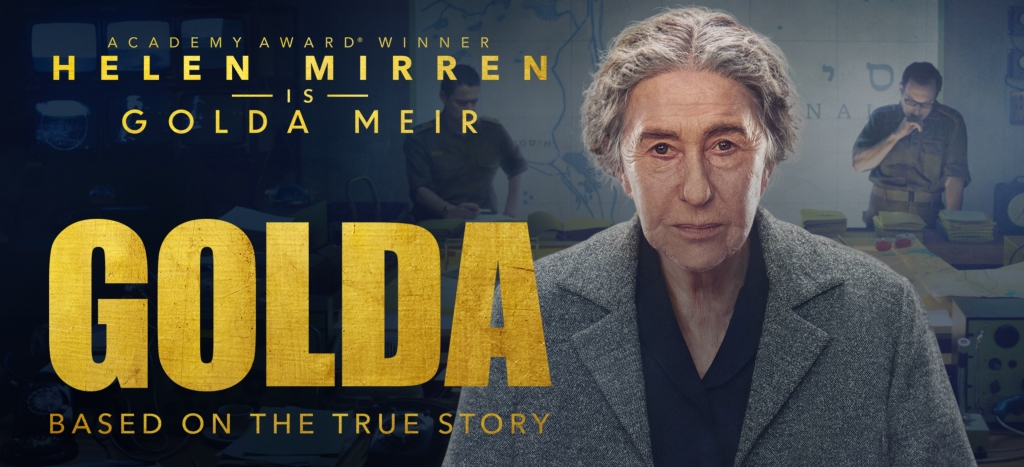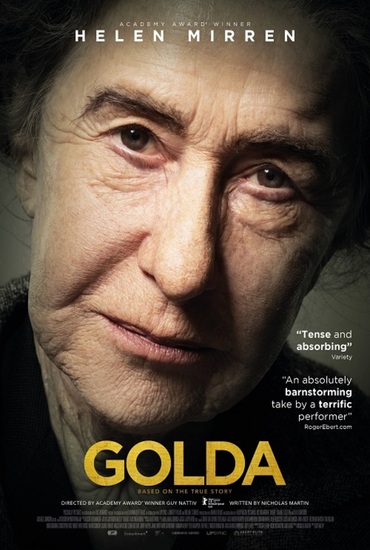
Last fall on a flight to visit my kids who live in Germany, I watched Golda (2023, PG-13), based on the horrendously difficult time in the life of Golda Meir, “Iron Lady of Israel,” when she served as Prime Minister during the Yom Kippur War, Oct. 6-25, 1973.
To back pedal a little before discussing more of the movie . . . Alan and I had originally planned to be on a cruise during the time of that flight last fall. We’d been looking forward to traveling around coastal Europe and the Mediterranean Sea, through the Suez Canal and down to Dubai in hopes of learning more about European and Middle Eastern culture. But, just before we were to sail, the current Israeli-Palestinian Conflict erupted and the cruise company offered us our money back, which we gratefully accepted. So, we flew from America to visit our kids rather than from Dubai, but while on that flight I was more than ever interested in trying to understand the history and nature of the conflicts in the Middle East.
Golda doesn’t explain the historical background, but Helen Mirren does a fabulous job of portraying the responsibilities and suffering of a woman in leadership during such a terrible time. Besides Tansu Çiller (22 Prime Minister of Turkey from 1993-1996), Golda Meir is the only woman to serve as the head of state in any Middle Eastern country during modern times. I found myself feeling the profound weight of all wars in the cost of lives—a feeling that started in 2014 when Russia invaded Ukraine and just won’t stop.
We have close friends who live in Tel Aviv. Our kids have close friends who live in Palestine. War is never about the people who want to live in peace, yet they are the vast majority of the people who suffer. When I ask my girl friend how to pray, she asks me to pray for peace and the safety of all who are innocent on both sides, particularly the children.
Oh, that people might learn to live in peace with one another. Oh, that nations would stop coveting their neighbors’ land and wealth. Oh, for the day when God’s commandments are observed from the heart: “Thou shalt not covet they neighbour’s house, thou shalt not covet thy neighbour’s wife, nor his manservant, nor his maidservant, nor his ox, nor his ass, nor any thing that is thy neighbour’s” (Exodus 20:17). Isn’t that the basic problem? Greed and the desire to take away from our neighbors what they possess? As Jesus taught, “For the commandments, ‘You shall not commit adultery, You shall not murder, You shall not steal, You shall not covet,’ and any other commandment, are summed up in this word: ‘You shall love your neighbor as yourself‘” (Romans 13:9, ESV). Can we unite in praying for ourselves, people everywhere, and the nations of the world to stop coveting and start loving?
Did you know the Bible teaches that someday Jerusalem will be the center of worship for the whole world? “And it shall come to pass in the last days, that the mountain of the Lord’s house shall be established in the top of the mountains, and shall be exalted above the hills; and all nations shall flow unto it” (Isaiah 2:2). Someday there will be peace among the nations of the Middle East: “In that day shall Israel be the third with Egypt and with Assyria, even a blessing in the midst of the land“ (Isaiah 19:24). Some day, people all over the world will recognize and worship God: “And it shall be said in that day, Lo, this is our God; we have waited for him, and he will save us: this is the Lord; we have waited for him, we will be glad and rejoice in his salvation” (Isaiah 25:9).
If you find yourself grieving like I do, let’s continue to “pray for the peace of Jerusalem” (Psalm 122:6), but let’s keep looking up and forward to the promise to a future day when all the world will live in harmony and worship together on the mountain of the Lord in Jerusalem!

